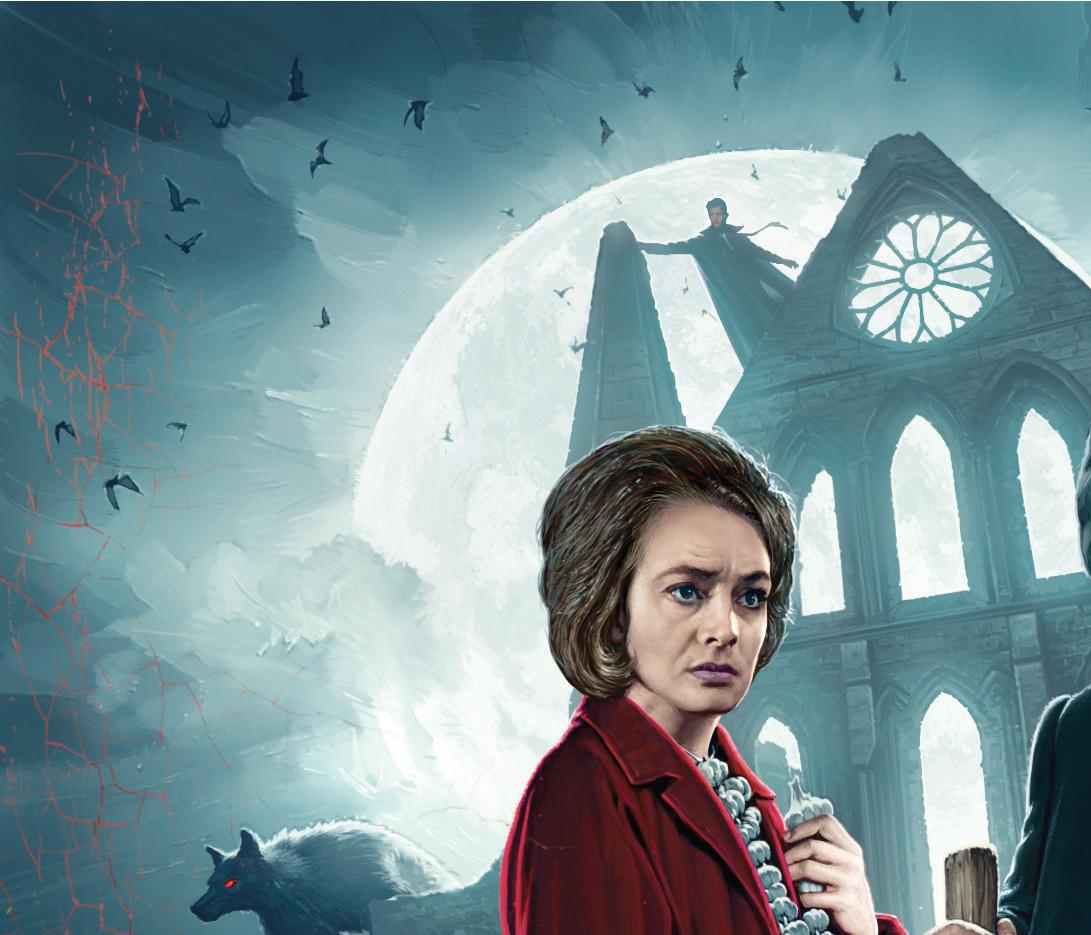
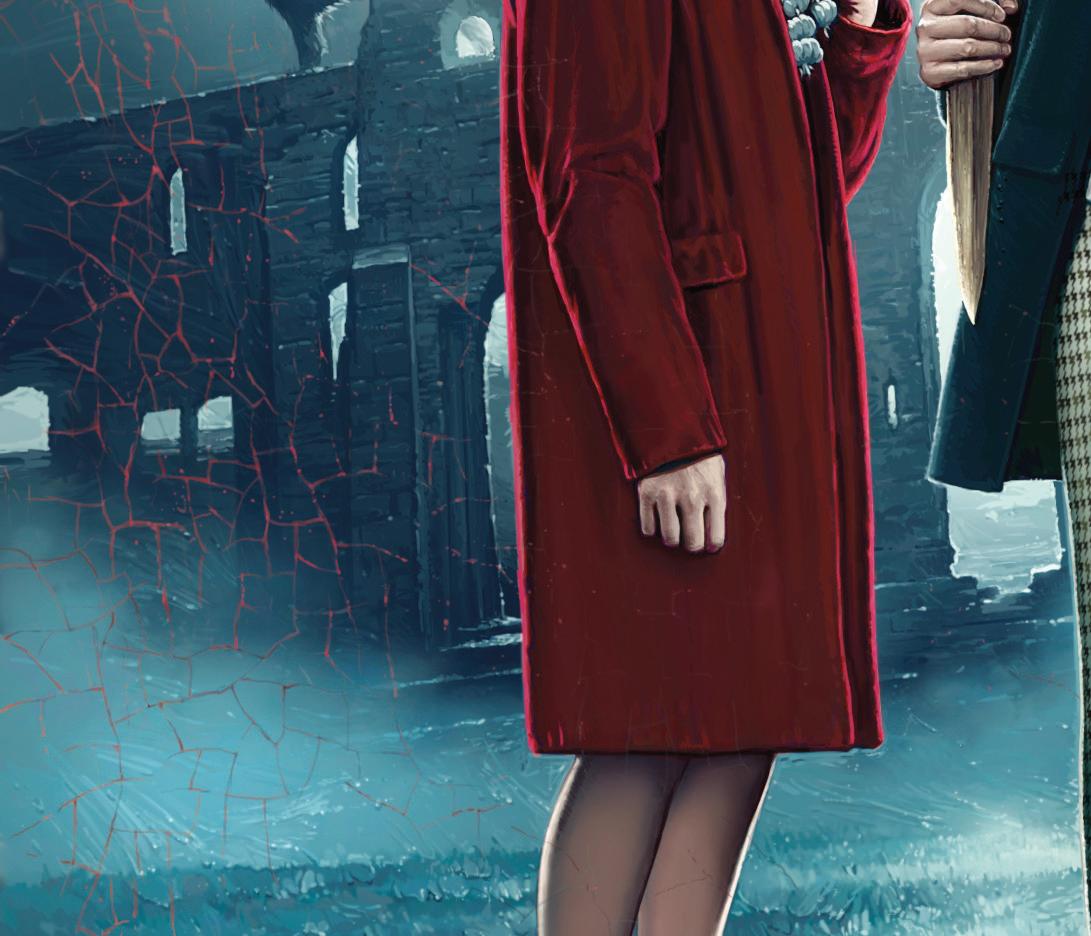
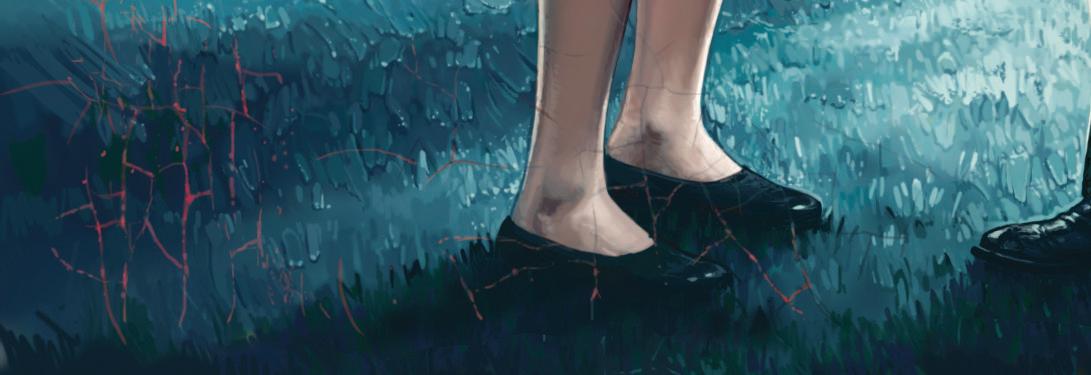
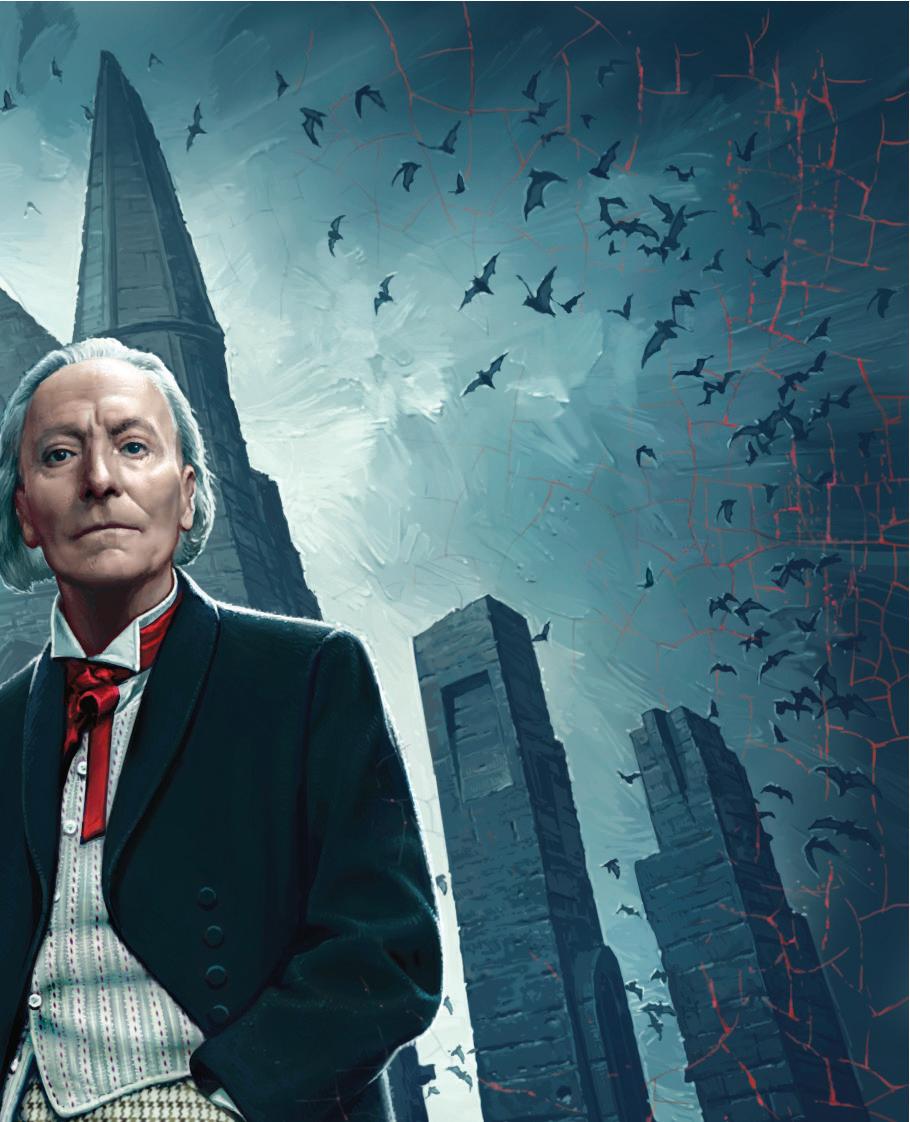
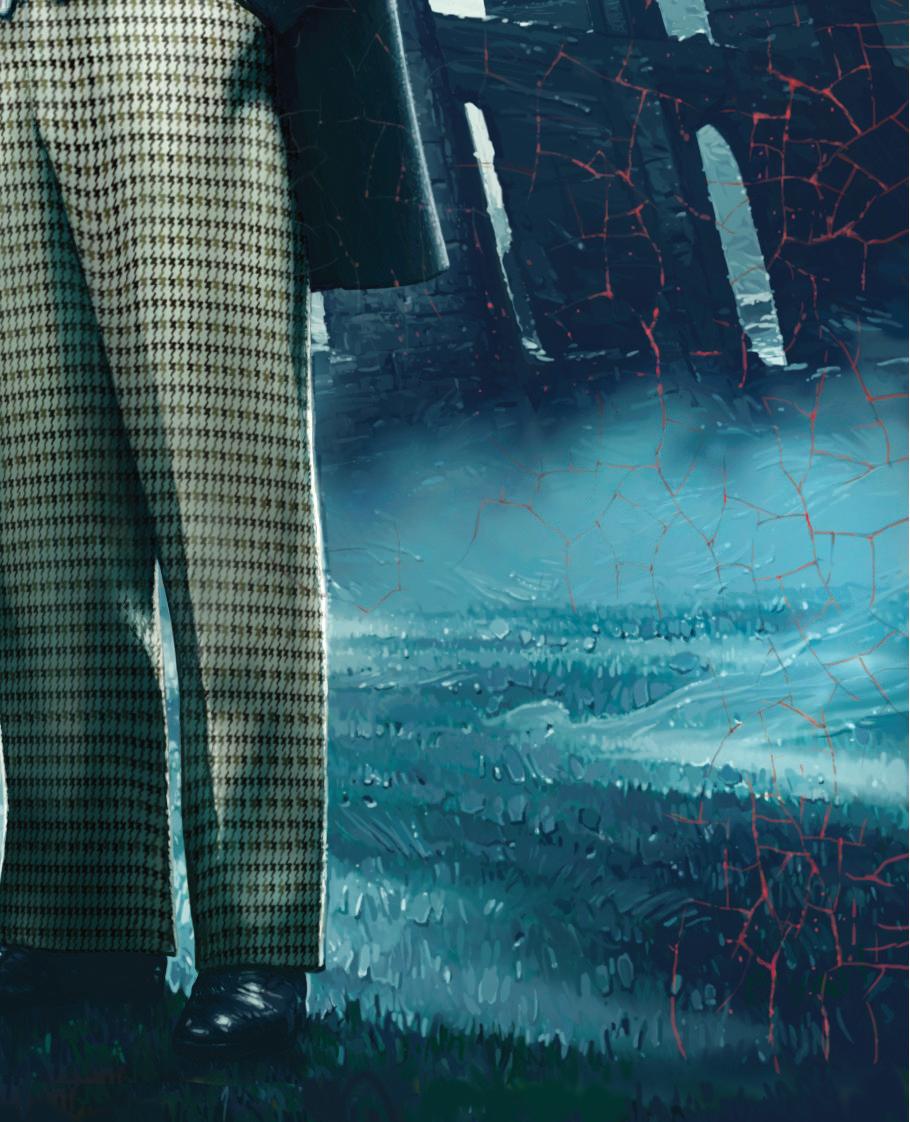
MAGRS D RACULA !






MAGRS D RACULA !
UK | USA | Canada | Ireland | Australia India | New Zealand | South Africa
BBC Children’s Books are published by Puffin Books, part of the Penguin Random House group of companies whose addresses can be found at global.penguinrandomhouse.com. www.penguin.co.uk www.puffin.co.uk www.ladybird.co.uk
First published 2025 001
Written by Paul Magrs
Copyright © BBC , 2025
BBC , DOCTOR WHO and TARDIS (word marks and logos) are trademarks of the British Broadcasting Corporation and are used under licence. BBC logo © BBC 1996. DOCTOR WHO logo and WHO insignia © BBC 2018. Dalek image © BBC /Terry Nation 1963.
The moral right of the copyright holders has been asserted Penguin Random House values and supports copyright. Copyright fuels creativity, encourages diverse voices, promotes freedom of expression and supports a vibrant culture. Thank you for purchasing an authorized edition of this book and for respecting intellectual property laws by not reproducing, scanning or distributing any part of it by any means without permission. You are supporting authors and enabling Penguin Random House to continue to publish books for everyone. No part of this book may be used or reproduced in any manner for the purpose of training artificial intelligence technologies or systems. In accordance with Article 4(3) of the DSM Directive 2019/790, Penguin Random House expressly reserves this work from the text and data mining exception.
Set in 11.5/15.5pt Bembo Book MT Pro Typeset by Six Red Marbles UK , Thetford, Norfolk
Printed and bound in Great Britain by Clays Ltd, Elcograf S.p.A.
The authorized representative in the EEA is Penguin Random House Ireland, Morrison Chambers, 32 Nassau Street, Dublin D 02 YH 68
A CIP catalogue record for this book is available from the British Library
ISBN : 978–1–405–97636–7
All correspondence to:
BBC Children’s Books, Penguin Random House Children’s UK One Embassy Gardens, 8 Viaduct Gardens, London SW 11 7BW
Penguin Random Hous e is committed to a sustainable future for our business, our readers and our planet. is book is made from Forest Stewardship Council® certified paper.
A B out t H e Aut H or
Paul Magrs was born in 1969 and grew up in the north-east of England. He brought out his first novel in 1995 and has published many books since, in all kinds of genres. In the world of Doctor Who, he has written novels such as The Scarlet Empress for BBC Books and audio dramas such as The Horror of Glam Rock and The Peterloo Massacre for Big Finish Productions.
He is the creator of Iris Wildthyme, and it was his scripts for BBC Audio’s Nest Cottage Chronicles that at last persuaded Tom Baker to return to the role of the Doctor.
In recent years, he has written a number of original novels for Puffin Books, in which Doctor Who is mashed up with classic children’s books, including Josephine and the Argonauts and Doctor Who in Wonderland
In 2024, he began a bookish channel on YouTube where he talks about all the books on his shelves and in his life. He lives and writes in Manchester with Jeremy and Bernard Socks.
You know I don’t like anything spooky!’ Helena had told him this again and again, quite clearly. She had made it very plain to her young man.
But James never listened, did he? Had he ever really taken her feelings into proper consideration? No, never!
Helena stomped all the way home from the theatre, alone and utterly furious.
Not that this was home, of course. She truly wished she was back in London. Things might not seem so bad there, in her usual surroundings. Here in Whitby, though, everything was unfamiliar and disconcerting. A thick sea mist had drifted over the dark harbour town, clogging up the narrow cobbled lanes and making her lose her way.
No, she knew she could figure out the route back to the little house at the top of the hill. She was no simpering ninny getting lost in the gloaming. Her small family had taken a cosy cottage for an autumnal week away in the north, which was definitely somewhere up this lane of shops, all their windows dim at this time of night. Only a couple of gas lamps lit her way up the slow incline towards the steps that
Paul Magrs rose to the top of the hill, but still, she felt confident and determined.
What a long way it was to stomp home alone in the dark. Such was the price for renting a house with a harbour view. Yes, it was stunning first thing in the morning when the sun rose over the churning North Sea – and it was equally as spectacular last thing at night when the sun’s final rays shone through the craggy ruins of the ancient abbey. But it was a long way when you were in a bad temper and wearing full skirts with a corset. There were one hundred and ninety-nine stone steps to make her way up and, inwardly, Helena was cursing her papa for choosing the high-up location of their holiday let.
The whole week had been a disaster. It was supposed to be a relaxing few days by the sea, but her fiancé was proving to be irksome in the extreme. He was boorish, and somewhat callous, and tonight he had demonstrated that he cared little for Helena’s feelings. Even though she had warned him that she disliked anything too frightening, he had insisted they both attend this evening’s performance at the Opera House. It was a play he had read such good things about in the paper and he thought they both might enjoy it.
Helena had sat in the front row of this dubious entertainment, gripping the arms of her chair in terror. She was aware of James chuckling at her discomfort throughout the macabre performance. At the interval, she had trembled and was shocked when he smirked at the tears on her face. ‘Oh, don’t be scared, you silly girl. It’s only a play. It’s made up!’ His taunting, flippant words made her turn on her heel and march right out of the theatre foyer with no intention of returning for the next act.
‘I told him,’ she gasped furiously to herself as she started up the stone steps. ‘I begged him not to take me to anything scary! He knows I don’t like such things. Papa will be furious with him. All week he has been taking exception to James’s brutish manners and boastful ways. He’d be only too pleased if I broke things off with him tomorrow . . .’
Such were the thoughts churning through the teenage girl’s mind as she ascended the damp steps, higher and higher above the cliffs of the harbour town. She was so bound up in her fretfulness that she barely noticed the splattering of icy rain and the wind that plucked at her skirts.
October in Whitby could be wild and unwelcoming. Perhaps that was why the holiday cottage had been so cheap this week. And then, of course, there were these recent disappearances. If you were to believe in such things. Most likely it was just young girls running away. Not murders or anything. Nothing like that, surely.
By the time she reached the top of the steps and St Mary’s churchyard, she was sopping wet and sobbing with the effort of the climb. She studied the silhouette of the church, the nearby abbey and the twinkling lights of the harbour below as she caught her breath. It was indeed a beautiful place, but she thought there was something dark and disturbing at its heart. There was an undercurrent that frightened her, and it had done so even before she accompanied James to that ridiculous theatre show this evening.
A horrid darkness. Here, her thoughts made her shudder. There was almost a feeling of wickedness about the place, an evil whisper in the air.
‘Helena . . .’
She jolted suddenly, feeling her heartbeat quicken. That really did sound like a whisper in the stormy air. A breath of wind that seemingly spoke her name.
‘Yes . . .?’ she asked, feeling slightly foolish as she slowly turned round, taking in the view of the squat, turreted church at the top of the cliff and its surrounding graveyard of blackened stones.
‘I’m here, Helena,’ said the voice. ‘Follow me.’
The voice was deep and husky. Helena didn’t recognise it at all, but somehow it was reassuring to her. And there was a sympathetic chord rumbling in her chest, like longing. She could feel the voice inside her mind, and she liked it. ‘Where are you?’
She turned about again, taking in her surroundings and the little lane that led to the row of cottages. Her home-fromhome lay there, safe and warm and glowing. She could hurry down that lane right now and expect a lovely, consoling welcome from her papa and her younger sister, Enid. Why, she should hurry over there right now. Right this minute. She should get herself indoors, out of the darkness, out of the rising storm, before she caught her death.
But she didn’t.
That voice had intrigued her. It had snagged her attention. Could it be James? Could he have followed her? Could he be playing a revengeful game? Maybe he sought to punish her because she had abandoned him during the interval, wasting the money for the ticket. It was just the kind of silly, childish thing he might do.
‘Come to me, Helena . . .’
But that wasn’t her fiancé’s voice. And the way it sounded in her mind like that. It was so strange. Surely, this couldn’t have anything to do with James.
No, this was something else.
She looked up towards the abbey, and there, silhouetted against the lights of the town far below, was a striking dark figure. It wore a cloak that flared out in the stiff sea breeze. The stranger was looking directly at her. They were reaching out with one hand and beckoning.
‘You will come to me, won’t you, Helena?’
And before she knew it, that was precisely what she was doing. Her velvet evening shoes squelched with rainwater, and her clothes felt damp and uncomfortable. Her face was a frozen mask in the night winds, but still, she smiled uncertainly at the stranger. Her discomfort and anger at her fiancé was forgotten as she stepped inexorably closer to the cloaked one at the top of the cliff.
The smiling stranger. Now, she could see those features more clearly.
‘But . . . but who are you?’ she asked as she came close enough for the dark one to open their arms and enfold her trembling body in their cloak.
Then Helena found she couldn’t say anything else. A terrible silence fell over her.
Early the next morning, soon after first light had crept over the horizon, the quay was busy with its usual vendors – fishermen and women readying their sharp knives. They
Paul Magrs
stood in their usual rough garments topped with woollen shawls, stooped over their barrels and tables, and began the day’s work of gutting and filleting the herring. Chattering among themselves, they set out their wares in slippery silver displays.
Only, this morning, there was more than just the ordinary tittle-tattle exciting the early risers. There was awful news. Dreadful news. The kind of blood-curdling news that added an extra dash of relish to the dawn chorus of seaside chatter.
‘There’s a body!’
‘They found a body!’
‘They found a dead girl lying at the bottom of the steps!’
‘There never was . . .!’
‘Oh, there was!’
‘And how had she died? Did she slip and fall?’
‘No one knows as yet. There’s been no word just yet.’
‘But what state was she in? Was she drained of all blood?’
‘Say it isn’t so! Did she . . . d-did she have the telltale puncture wounds in her neck?’
‘Oh, yes. Oh, yes, indeed. That’s what they’re all saying. They’re saying that all these murders are just the same. They’re just like it was before. Just like last time. Remember? Last time he was here. About ten years ago. Just like then.’
‘Saints preserve us. Please say it’s not true. Please don’t let it be true.’
‘That’s what they say. That’s what they’re saying.’
‘But it can’t be. It can’t be him again, can it? It can’t possibly be!’
The whispers were winding their way from the women of the fish quay through the higgledy-piggledy alleyways of the town. They grew in force and conviction as the morning became lighter, and the news of the dead girl spread further and wider among the population of the northern harbour town.
‘Helena – they say her name was Helena.’
‘That poor girl! I hope . . . I hope that she can rest easy . . .’
‘Oh, please don’t let it be true . . .’
‘But they say that it is. They say that he is back.’
‘Who? Who?’
‘Guess! Just you guess who’s back in town.’
Later that same day, as gossip and hearsay moved like sea mist through the alleyways, there was another new arrival in town. In the very same churchyard where Helena Ferris had met her terrible fate, a battered blue box had slowly materialised out of thin air. It solidified with a grinding, roaring noise that was partly whisked away by the sound of the sea crashing against the rocks far below.
One of the doors of this ‘Police Box’ eventually opened cautiously after the occupants had finished checking that the atmosphere was completely safe. Then they emerged: four travellers, intrigued by their new surroundings and gazing around at the graveyard. The sea wind had them gasping to catch their breath.
‘Goodness me!’ cried the oldest of their party, who had streaming silver hair and was wearing an opera cape. He clasped his astrakhan hat on to his head before the breeze could snatch it away. ‘How very bracing!’ he chuckled as he sheltered in the lee of his police box and locked the door behind them.
With him sheltered a dark-haired girl – his granddaughter,
Susan. ‘Are we really in England?’ she asked him eagerly. ‘Have you managed it, Grandfather? Have you really brought them back home?’ Susan was devoted to her grandfather. She believed he could do anything, and she knew it was only a matter of time before he delivered their two human friends back to their native land.
Speaking of whom, Miss Wright and Mr Chesterton – or Barbara and Ian, as Susan now knew to call them – had walked away from the box and were tentatively exploring the graveyard high atop the wind-blown cliff. They stumbled in the long grass, calling to each other and reading out the dates on the graves. There seemed to be a rising note of excitement in their voices.
Her grandfather patted her shoulder lightly. ‘Yes, yes, I believe I have achieved the well-nigh impossible, my dear. I have returned your schoolteachers to their own country in just about the correct year.’ He laughed in a self-satisfied way. ‘Quite a feat, oh yes! What with all the narrow scrapes we’ve been through in recent weeks. The TARDIS has been quite discombobulated, and so, I may add, have I.’
‘You’re a genius, Grandfather.’ Susan smiled at him.
He modestly conceded that this was true and sighed happily. ‘Well, I just hope that our friends Miss Wright and Mr Chesterfield are grateful for all the work they’ve put me to in calculating our route back to this place.’
‘It doesn’t look much like London.’ Susan frowned, peering beyond the jagged headland at the wild and tossing sea.
‘Evidently, we are a few miles from where we started
Paul Magrs
out in Shoreditch,’ the old man said huffily, as if Susan had criticised him. ‘But that’s what buses and trains are for, aren’t they? What do they want, hmm? Door-to-door delivery? My ship isn’t a taxi service, is it?’
Far from it, Susan thought with a smirk as she watched her grandfather march over to the two schoolteachers. She recalled the series of terrifying adventures that their small party had endured since taking off from East London . . . how many months ago? She could hardly remember, knowing that relative time meant very little aboard the TARDIS . They had been to all kinds of strange and exotic locations in time and space, never quite managing to return anywhere even close to London in 1963. Now, it seemed, however, that success might be at hand.
It struck Susan then that, if this really was the time that her two teachers belonged to, they might very well be about to bid farewell to each other. She felt a strange, dismayed sensation in her chest, in the region of her two hearts. She would miss them terribly, she realised. They had come to feel like a little family.
She hurried over to the others, through the tangled marram grass, dodging between blackened headstones, to where the grown- ups were talking above the noise of the wind.
‘It’s definitely England, then?’ Grandfather’s eyes were gleaming with triumph.
‘Well, yes, it is,’ said the reasonable and affable Mr Chesterton. He was a science teacher and approached things gradually and according to the evidence of his senses. ‘These
gravestones have inscriptions that would certainly suggest we’re in England.’
Barbara straightened up from where she’d been examining one of the stones. ‘Though the elements have eroded many of the details. Looking at some of these, they seem to have almost melted away.’
‘Melted?’ said the old man harshly. ‘How fanciful!’ He put his spectacles on to his beaky nose and glared at the closest graves. He saw at once what Barbara had meant. ‘I see. How interesting. Yes, quite hard to read.’
‘All the birth and death dates belong to the nineteenth century,’ said Barbara. ‘As far as I can make out.’
Hope flared briefly for Susan. Was Barbara saying that they had come to the wrong time, after all? Perhaps they wouldn’t be splitting up and going their separate ways quite so soon . . .
‘There’s only one way to be sure exactly when and where we are,’ Ian said sensibly. ‘There’s a harbour town down there. Quite small, though it looks to be rather welcoming. The chimney pots are smoking, and there are signs of life in the streets. What do you think? Should we go down the cliff path and check it out?’
Barbara smiled. ‘If I’m not mistaken, I believe I can smell the delicious aroma of frying fish.’
Susan’s grandfather clapped his hands delightedly. ‘Fish and chips! We haven’t had a fish supper since we left East London! What a marvellous idea!’
They went off then to discover that the route down into town from the corner of the graveyard involved descending
Paul Magrs
a winding track of one hundred and ninety-nine steps. The view of the harbour and the wide sea was spectacular but dizzying as they descended.
‘You know, this place rings a bell with me,’ Ian muttered thoughtfully.
‘Somewhere you’ve visited before?’ Barbara asked.
‘No, but somewhere I’ve heard of. These funny steps and that church at the top of the cliff. And look!’ He pointed back the way they had come, and suddenly, they all took note of the ruined abbey outlined against the pearly grey of the sky. ‘Those ruins are very familiar, I think.’
Barbara clicked her fingers. ‘Whitby! That’s where we are. That’s Whitby Abbey, destroyed by the Vikings in the ninth century.’
Ian grinned ruefully at her usual historical expertise. ‘Well, judging by the state of the place, I’m guessing that we’re safely some time after the year 900. What do you think, Doctor?’
‘Yes, yes,’ he muttered, short of breath as he tackled the steps. He waved his cane about irritably. ‘Very impressive, I’m sure. Now, could we just get on and find somewhere comfortable to sit down and share a pot of tea, perhaps? This chill in the air is getting on my nerves. And then, when we’re fully refreshed, we can go exploring!’
Susan took his arm to help him down the rest of the stone steps, and he shook her off crossly. ‘I’m quite capable, dear child!’ he barked at her.
‘I think we should brace ourselves for disappointment. This can’t be our time,’ Barbara remarked to Ian.
He frowned. ‘What makes you say that, Barbara?’
‘The abbey is rather more complete than it is in our time, I think, which means that we’re here before 1914 when the Germans shelled it. I’m sorry, Ian, but we appear to be here much too early.’
Her friend sighed, though he had already suspected as much in his heart. Something about seeing the quaint little harbour town from above had made him realise that they were visiting the past. Everything about it just looked so old-fashioned. Now that they were coming to the end of the steps, they found themselves in a cobbled lane, and it was obvious that the shops and dwellings around them belonged to a different era.
‘Oh, never mind,’ said Barbara. ‘At least we get to see some of the recent past on our travels. There’s so much to learn from – this is probably our grandparents’ time.’
As the small group wandered down the cobbled hill, they joined the throng of locals, who were dressed in what looked like Victorian clothes: dark and drab formal suits for the men and elaborately hooped garments for the women. From what Susan could see, the poorer folk were wearing little more than rags. One thing united the mixture of classes, though, despite any differences in how they were attired: they all stared at the newcomers with hostility and suspicion.
‘Whatever is the matter with these people, do you think, Doctor?’ Ian asked the old man.
‘I believe they’re a rather insular people.’ The Doctor sniffed. ‘Perhaps unused to strangers such as ourselves.’
Paul Magrs
That could be it, Susan thought. But there was something else, too, a very uneasy feeling in the air. She was quite sensitive to these things, being somewhat of a telepath. If she concentrated hard enough, she could pick up on the underlying emotions in a place, or among a crowd. And what she was detecting here was fearfulness. Yes, there was a feeling of incipient fright. It permeated the very air of the town.
Ian had wandered over to a small newsagent’s stand that he’d spotted and was returning with a local newspaper. ‘I’m lucky they accepted a 1960s shilling.’ He sighed. ‘Though I don’t think the old chap knew what I’d given him.’
The Doctor was impatient. ‘Well, Chesterton? What date does the paper give, hmm? Are you going to tell me that all my calculations were way off?’
Ian smiled at him. ‘This is the Whitby Gazette, dated Wednesday 30th October . . . 1901.’
‘Oh dear!’ Barbara said. ‘Still, we should have known.’
The Doctor chortled. ‘So near and yet so far! Well, never mind! Better luck next time, eh? Now, what about these fish and chips, eh?’
Susan smiled at her schoolteacher friends. ‘I know you must be terribly disappointed. But selfishly, I’m rather glad that you’re both going to keep travelling with us.’
Barbara was about to say something about having mixed feelings about the whole thing when Ian interrupted the conversation. ‘Look at this. It seems our arrival may have coincided with something rather terrible happening here.’
‘What’s that, hmm . . .?’ asked the Doctor, his interest piquing.
Ian showed them the headline on the cover of that afternoon’s Whitby Gazette : ‘Young Girl Found Dead. Another Ghastly Murder’. And then, in bold italics, the newspaper queried: ‘Has the Horror Returned to our Town?’
There was no doubt about it. The play was a roaring success. It was a full house every night, and the audiences were loud and appreciative. Sometimes, they laughed and stamped their feet, and they often screamed and cried out at the scary parts. The Opera House was bursting at the seams each night. Profits were going through the roof! The manager should be delighted.
Fainting ladies were given smelling salts in the foyer after each performance, which was enough to put a glow in his heart and a little spring in his step. Yet still, a strange feeling of guilty unease nagged at Albert Bishop.
That afternoon, his sense of foreboding came from the copy of the Whitby Gazette that old Mrs Antrobus from the ticket booth was waving at him. ‘Another body, Mr Bishop!’ The ancient dame glowered at him. ‘Look, there’s a drawing! With the blood coming out of her neck and everything.’ Mrs Antrobus thrust the paper at him and jutted out her chin grimly. ‘Surely it’s a bit much of a coincidence, eh? What do you think is really going on?’
Albert Bishop sighed. His ticket office lady was an old
busybody. She had hair like candy floss and a ruffled blouse covered in ropes of necklaces made from Whitby jet beads. Those black stones were reputed to ward off evil spirits – hence their popularity in the town – and Mrs Antrobus, like many of the locals, subscribed eagerly to such superstitious nonsense. Mind you, Albert found that even his level-headed outlook was faltering somewhat lately, what with this spate of recent murders.
‘I think someone is copying this play of yours,’ Mrs Antrobus told him. ‘Either that or these performances are summoning evil back to our shores! Regardless, it’s all down to this raving theatrical success you’re enjoying, Mr Bishop.’
The manager waved her away, pooh-poohing her silly suggestions. It was all nonsense. She was overreacting as usual and getting carried away. ‘Mark my words, Mr Bishop,’ she said darkly. ‘Some of us women of the town . . . we have great intuition. And we know when something dreadful is going on!’
Arthur Bishop hurried away from her, tut-tutting. He’d thought she’d get round to her special gifts sooner or later. He was so sick of the special ‘witchy powers’ of the local womenfolk. They hardly ever shut up about them.
Dismissing Mrs Antrobus from his mind, Arthur hurried around the back of the stage and the warren of dingy, whitewashed corridors where the dressing rooms lay. At this point in the afternoon, backstage was relatively quiet. Most of the cast and crew were off resting or having something to eat. All the props and costumes were strewn on tables and racks, ready for this evening’s performance. The manager